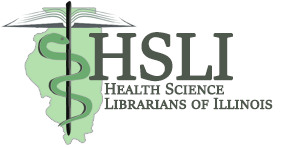“AI in Health Sciences Librarianship: The Future is Now”
Presentation Topic Title: Patron Data, Privacy Concerns, & Vendor Patron Data, Privacy Concerns, & Vendor AI Tools in Libraries
Panelist: Scott Thomson

Scott Thomson is the director of the library at Rush University Medical Center. He has been a medical librarian for over 20 years, and has worked at HSLI member institutions for over 14 years. He has experience in administration, instruction, and consumer health. In addition to his experience in library science, he holds a master’s degree in healthcare administration, and a certification in copyright and fair use from the University of Maryland University College.
In this presentation, we will discuss how AI is impacting patron data and privacy, including how publishers may be gathering and using patron data, and how AI may be interacting with and affecting the content they offer. This discussion will be framed around a brief overview/refresher on copyright, since certain concepts, like fair use, and transformative use, are relevant. Finally, we will offer some practical tips on how libraries can remain informed and assert some control over these changes.
Learning Objectives:
Quick overview – how copyright works
- What is copyright
- What is copyrightable
- Fair use
Publishers/vendors, and AI
- How publishers are already using AI
- Practical issues with publisher AI use
- Publishers licensing content for AI training
- Unlicensed training/use of copyrighted material
- AI errors
- Implications for libraries, and suggested next steps
Panelist: Dr. Donghua Tao
With more than 20 years of experience in health sciences librarianship and informatics, Dr. Tao joined the University of Illinois Chicago (UIC) in May 2023 as Professor and Associate Dean, Associate University Librarian for Health Sciences, who oversee three health sciences libraries to support education, research and clinical practice in UIC’s seven health sciences colleges and the University of Illinois Hospital and Clinics and other affiliated hospitals.
Dr. Tao’s research and teaching interests center on human health information behavior, user experience & information system/service evaluation and adoption, consumer health informatics, and information literacy/health literacy. They all boil down to the roles of health information and information and communication technologies (ICTs) in facilitating health information access, management, sharing, and dissemination in the teaching, learning, patient care, and community health contexts.
Dr. Tao is engaged in networking and collaborating locally, regionally, and internationally. She completed the Association of Academic Health Sciences Libraries (NLM/AAHSL) Leadership Program in 2021-2022 and participated in the inaugural Women in AMIA (WIA) Leadership Program in 2019. Dr. Tao is a Fellow of the American Medical Informatics Association (FAMIA).
Presentation Topic Title: From “Can ChatGPT Answer Medical Questions?” to Librarians’ Role in the AI Era
The rise of artificial intelligence (AI) tools such as ChatGPT has sparked widespread curiosity and caution about their potential to answer complex questions, including those related to medicine, law, and education. While AI tools can provide quick information, they also raise important questions about accuracy, authority, ethics, and the human role in knowledge work.
This conversation naturally extends to the library profession. Just as people wonder, “Can ChatGPT answer medical questions?”, the real question is “What is the librarian’s role in the AI era?” Rather than being replaced, librarians are uniquely positioned to serve as guides, curators, and ethical stewards in this new information ecosystem. Their role evolves from gatekeepers of information to collaborators with AI, helping communities critically evaluate resources, integrate AI responsibly, and ensure equitable access to trustworthy knowledge.
Expected Learning Outcomes
- Understand the impact of AI on information access and library services.
- Develop strategies for integrating AI tools responsibly in library practice.
- Appreciate the evolving role of librarians as educators, curators, and advocates in the AI era.
Panelist: Evangeline Reid

Evangeline Reid, MLIS, leads reference and instruction at Aurora University – known for its nursing and health science programs – and serves on the General Education and Core Curriculum Steering committees. She holds a BA from the University of Chicago in English Language and Literature with a minor in art history and an MLIS from Dominican University. She has completed the Certificate in Open Education Librarianship from the Open Education Network and the Creative Commons Certificate, which guide her work in promoting the adoption and creation of Open Educational Resources as powerful teaching and learning tools.
Presentation Topic Title: AI Literacy for Instruction and Research in the Health Sciences
If generative AI is here to stay, librarians are tasked with supporting our users in navigating its strengths and limitations as a tool for finding information. From communicating essential information literacy points about gen-AI tools like ChatGPT and Google AI summaries in classrooms and conversations, to the implications for more involved academic research, librarians have plenty to cover. At the same time, we must balance a variety of concerns, including privacy, accuracy, and prioritizing learning for students.
Learning outcomes:
- Learn essential strengths and weaknesses of gen-AI for information seeking
- Connect new gen-AI conversations to foundational information literacy concepts
- Identify ways to incorporate gen-AI tools into health sciences research for tasks like creating PICO statements, while still engaging critical thinking and learning
